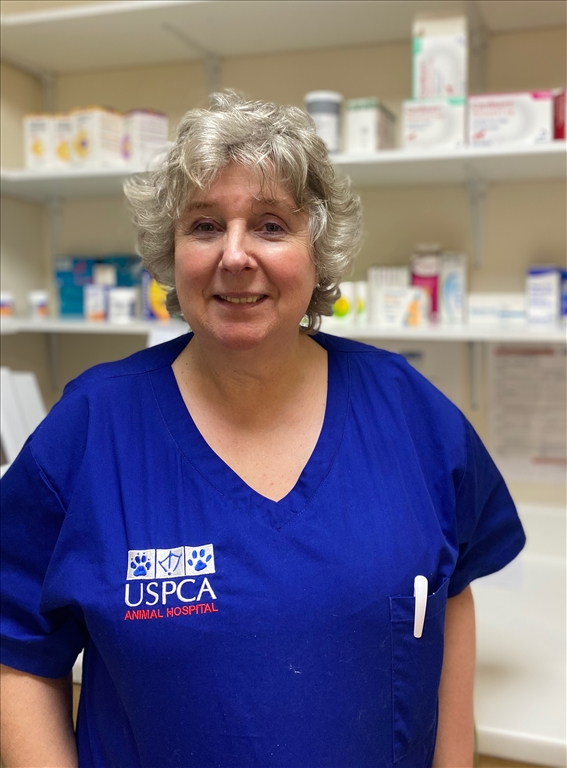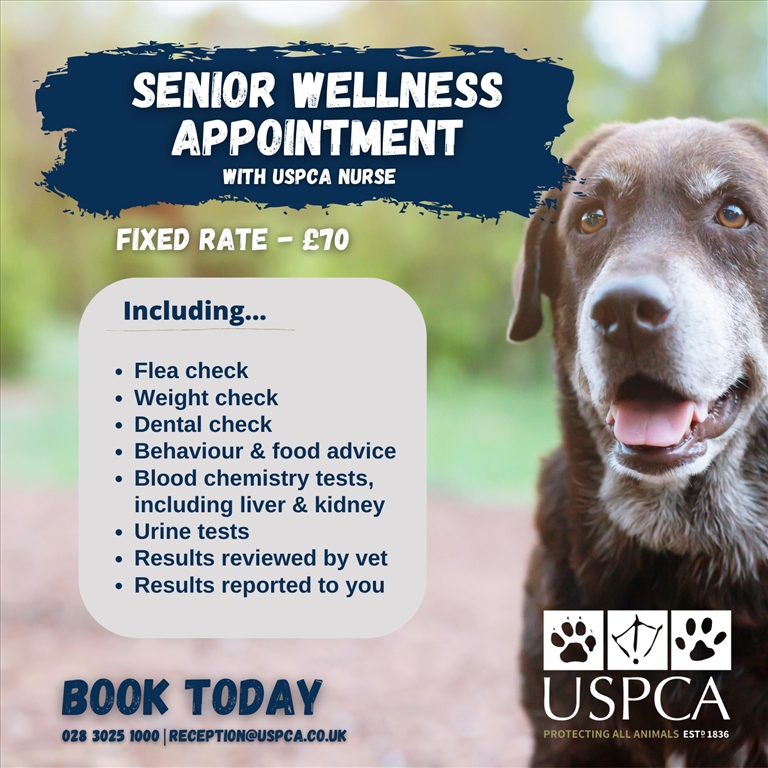Caring for your Senior Pet
 Our pets make such wonderful additions to our families – whether you welcome them home as a young pup or kitten or decide to open your doors to a rescue who may be a little older.
Our pets make such wonderful additions to our families – whether you welcome them home as a young pup or kitten or decide to open your doors to a rescue who may be a little older.
No matter what age they are when they enter your life, the inevitable is – that just like us humans – our pets will eventually enter their senior years. Drawing similarities with their owners, our pet’s health can be affected by many factors during their lifetime and as they enter the ‘golden oldies’ stage, they may be more susceptible to developing certain health conditions. It’s vitally important to keep on top of their health through routine checks and looking out for signs of certain illnesses which are more common in our older pets.
Check out some great advice from our Senior Vet, Gillian Alford, to help your much-loved older pet lead as happy and healthy a lifestyle as possible:
Spotting the signs
Observation is key in determining if your pet is feeling out of sorts – unfortunately our pets can’t tell us when they are feeling unwell so it’s up to us as pet parents to have a keen eye for what is deemed ‘normal behaviour’ and what might be an indication that something is wrong. If you ever have any concern regarding your pet’s health – no matter how big or small – always contact your vet. They are trained professionals who will always have you and your pet’s best interests at heart – do keep in mind that there is no such thing as a stupid question!
What to look out for
Just like us humans, pets can suffer from a range of, some of which are listed below along with steps that can be taken to help avoid them.
- Cancer – higher risk in obese dogs and females – avoid by maintaining your pet’s weight and avoiding a high carbohydrate diet. Female dogs should be spayed before 2 years of age. Although rare, breast cancer is typically found in un-spayed, non-breeding female cats – these too should be spayed.
- Heart Disease – risk factors are linked to certain breeds, Connective Tissue Disorder and poor Dental Hygiene. Help this by avoiding affected breed lines and getting routine dental procedures carried out.
- Constipation – seen mostly in dehydrated cats, avoid by maintaining proper hydration.
- Dental Disease – Seen in both cats and dogs with the accumulation of plaque and tartar. Best avoided through routine dental procedures.
- Obesity – risk factors in cats and dogs include genetic inheritance, excessive calorie intake and lack of exercise. Help this issue through avoiding affected genetic lines, controlling calorie intake to maintain optimum weight, and ensuring regular exercise.
- Endocrine Diseases such as Cushings Syndrome, Diabetes Mellitus, Hypothyroidism, and Acromegaly (cats). Risk factors can include tumours, long term therapy with corticosteroids, obesity, and high iodine intake. Elderly cats around 16 years of age are more susceptible to hypothyroidism. Helping to avoid these issues can include avoiding long term corticosteroid administration, avoiding obesity, and ensuring weight loss if obese, avoiding high iodine intake and avoiding the feeding of raw food containing thyroid tissue.
- Osteoarthritis – seen both in cats and dogs with risk factors including trauma, laxity in the joints and excessive food intake. Avoid excessively vigorous exercise and reducing food intake by 25% - maintain a body condition score of 4.5-4.9
- Renal Disease – risk factors for cats and dogs include Obesity, Diabetes Mellitus, Hypertension and infections. Help to avoid by maintaining your pet’s weight, managing diabetes and hypertension, and implementation of therapeutic diets.
- Pancreatitis (dogs) – can be induced by high fat consumption. Avoid feeding your dog high fat foods.
- Prostate disease – this will occur in unneutered male dogs and cats. Ensure your pet is neutered to avoid.
- Feline Triad Syndrome (FTS – cats) but may occur individually – Irritable Bowel Disease, pancreatitis and Cholangitis/Cholangiohepatitis Hepatic Lipidosis (Fatty Liver) – can be caused by high fat consumption and Obesity Diabetes Mellitus. Avoid in your pet by not feeding high fat foods.
- Pyometra – seen in un-spayed female dogs where the uterus is filled with pus. Spay your female dogs if not breeding or when finished breeding.
- Hepatic Lipidosis (dogs) – risk factor around Obesity Diabetes Mellitus. Help to avoid this by maintaining optimum body weight and condition.
- Vestibular Syndrome (cats) – otitis external – can be avoided by maintaining a clean external auditory canal.
 Routine health checks
Routine health checks
As the years go by, it’s important to keep checkups a regular part of your pet’s routine. Routine health checks with your veterinary team can ensure that different areas of your pet’s health are under frequent review and gives you the opportunity to address any concerns you may have. During your appointment you can also discuss your pet’s vaccinations to understand why and how often your older pet should be receiving them.
The USPCA veterinary team has recently launched its Senior Wellness Appointments, geared towards our old and wise pets, to help you keep on top of their health and assess any problem areas mentioned above.
Making a difficult decision
Unfortunately, in some cases, you may have to make an incredibly difficult decision if your pet is facing severe illness, pain, or discomfort. In our experience, it is always a struggle for owners to know whether they are making the right decision or not – which is understandable. We all adore our pets – including your veterinary team who are totally committed your pet’s quality of life and can help you make an informed decision that provides the best outcome for your pet and relieves suffering.
Of course, we all wish we could spend our entire lifetimes with our companion animals but that unfortunately cannot be the case. While never enough, we do have some time to provide as much love and care for our pets as they do for us – and part of that is ensuring that they live a happy and healthy life, well into their senior years. When discussing your pet with your veterinary team, it’s important to take on board their advice, commit to any recommendations, and always speak to them before changing / stopping suggested treatments.
If you have any questions regarding your older pet, please book an appointment or check out our Senior Wellness Appointments today – call 028 3025 1000.
Back








